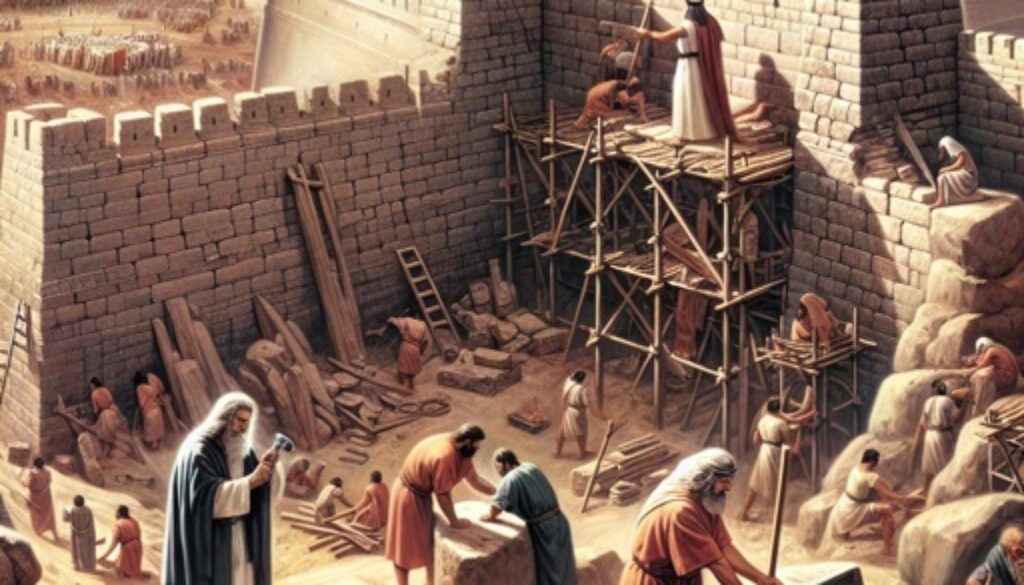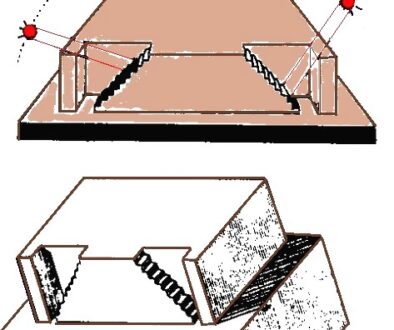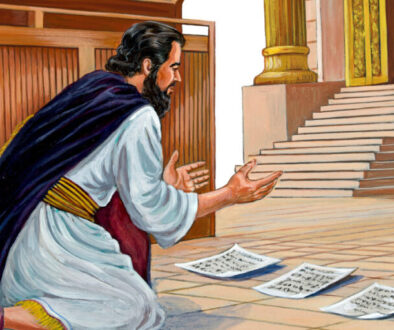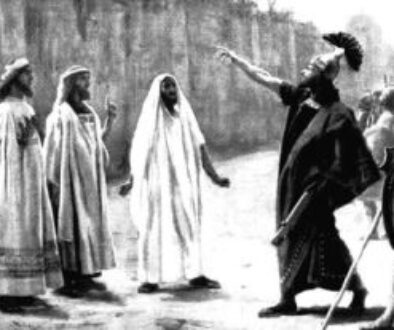1 Kings 16 Baasah
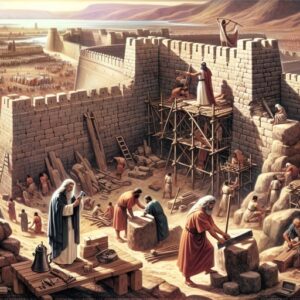
Baasha takes the throne after killing Nadab. He also killed every male in Jeroboam’s family. As part of God’s judgment, but he is judged for it too.
We don’t have a lot of information about King Baasha’s rule. There are a few pieces we get a glimpse into by looking at Asa’s reign. Here is what I do know; 1) he took the throne through assignation, 2) he killed all of Jeroboam’s descendants, 3) he had a treaty with Ben-hadad, 4) he was building up Ramah to keep anyone from crossing over to or from Judah, 5) he abandoned this project when Ben-hadad attacked him, 6) his son Elah would follow him on the throne, and most importantly, 7) he did evil in the sight of the Lord and earned the same judgment as Jeroboam.
I have to admit to having a hard time turning his story into a ‘first hand’ account. Let’s see where the Spirit leads us on our journey.
♥ ♦ ♥
Baasha is used to command. Going from commander of Israel’s army to king isn’t a huge leap. Not like Nadab, who had no command experience at all. His first command is to rid the world of the line of Jeroboam. First it was Nadab, next it was every male in the line of Jeroboam.
Baasha sits back in comfort as he contemplates his new position. All Israel crowned him king. They wouldn’t dare do anything different, for all the commanders of the army support him.
Baasha’s next order of business is kingdom security. “Judah can’t hold out forever” he tells himself. He begins planning Israel’s next attack. It doesn’t take long for him to come up with a plan he is comfortable with.
Two days later, Baasha and Israel are across the battlefield from Asa and Judah. Baasha can hear Asa calling out to his people. He has no doubt that he is calling on the name of the Lord. To give his men confidence, he calls out to them also.
“Our gods are strong. Take courage. We will defeat Judah!”
The only problem with this is that he is not certain within his own heart of this. He has spent much of his life worshiping the god Jeroboam erected, but he is not stranger to the stories of old and the works of God.
The trumpets sound and both armies rush towards one another. It takes less than an hour before Israel is fleeing back to their own territory, defeated by Judah’s God. Baasha goes home in defeat.
Baasha focuses on the Philistines for a while. He isn’t having any more success with them than he was with Judah.
Baasha turns to little skirmishes along his borders. He doesn’t do an all-out push again. What he does do, after many years, is to ally Israel with Ben-hadad, the king of Syria.
“I will trade with you and offer my protection if you are attacked. But I won’t commit my forces to rescue you from a war that you have brought on yourself” Ben-hadad lays out for Baasha.
“And what if you are attacked” asks Baasha. “Do we come to your rescue?”
Ben-hadad laughs. “I would like to see the nation that thinks they can take on us!” Ben-hadad looks Baasha in the eyes; “Just keep the tribute coming and there won’t have any problems.”
It’s not exactly what Baasha was hoping for, but it will do. At least he won’t lose any more cities to Judah.
Things remain status quo for many years before Baasha realizes he has another problem. He is losing people to attrition. More and more people are deserting Israel and turning to Judah for refuge. He has been watching it happen for years. His spies have even reported of people passing from Judah into Israel, only to return ‘home’ with many of his people in tow.
“Enough is enough!” Baasha storms around his throne room. “I have put up with this for more that 20 years. This ends NOW!”
Baasha draws up plans for a blockade to be built in Ramah. “This is the point of the biggest flow of people from one nation to the other. We will build a wall and a battlement to keep people from crossing into or going out of Israel. It also has a defensible narrowing that will make the task easier. After Ramah is completed, we will start on other points of entry.”
Baasha’s advisors agree that this is a good plan. Baasha orders construction to begin right away. He visits often to see how it is progressing.
While Baasha is concentrating on his building efforts, Asa takes notice of what is happening on Judah’s borders.
“He is trying to pin us in. If he succeeds in doing this, then we will eventually be cut off from all trade. We cannot let this happen!”
Asa knows about the treaty Baasha made with Ben-hadad. Before now, it was of no consequence to Judah, but if Judah attacks Israel, Ben-hadad will step in on Israel’s side. But if Asa can get Ben-hadad to break the treaty, this could solve Judah’s problems.
Asa sends a letter to Be-hadad behind Baasha’s back. “There is a covenant between me and you, as there was between my father and your father. Behold, I am sending to you silver and gold. Go, break your covenant with Baasha king of Israel, that he may withdraw from me” (2 Chronicles 16:3).
Ben-hadad is pleased with what Asa has sent him. And Asa is correct regarding good long-standing relations between the house of David and his fathers. Besides that, Ben-hadad never promised to stand behind Baasha when he went after another people.
“I can’t stand with Judah publicly against Israel. That would be me breaking my word. But I can trouble Israel so that Baasha’s attention is drawn elsewhere.”
Satisfied with this answer, Ben-hadad sends raiders out into the edges of Israel. Ben-hadad conquered Ijon, Dan, Abel-maim, and all the store cities of Naphtali before finally withdrawing. By that time, Judah had rushed into Ramah and stolen all the stones that were laid. Baasha was defeated once again.
While Baasha is ‘licking his wounds’, the Lord sends the prophet Jehu to him.
“Since I exalted you out of the dust and made you leader over my people Israel, and you have walked in the way of Jeroboam and have made my people Israel to sin, provoking me to anger with their sins, behold, I will utterly sweep away Baasha and his house, and I will make your house like the house of Jeroboam the son of Nebat. Anyone belonging to Baasha who dies in the city the dogs shall eat, and anyone of his who dies in the field the birds of the heavens shall eat” (1 Kings 16:2-4).
Baasha is angry with these words. “Leave me! I will hear no more from you today.”
After Jehu leaves Baasha begins pacing his throne room. He knows that he was the fulfillment of God’s prophecy to Jeroboam. And that he did nothing to bring the people back to the Lord God of their fathers. “If I let them worship the Lord, I will lose all the people. I WON’T let that happen!” Baasha hardens his heart.
Not more that a year later, Baasha succumbs to gruelingly painful death of heart failure. If the physician were to make a guess as to when Baasah’s heart began to fail him, they would point to the day of Jehu’s visit.
Baasha reigned for 24 years as King of Israel. The place of his palace was Tirzah. And his son Elah takes the throne after his death. Baasha was buried in Tirzah.
(to be continued)
I did a lot of extrapolating with Baasha’s story. We are not told how Baasha died, but I can’t imagine God allowing him a comfortable death after His judgment against him. I know second hand of the agony a heart condition causes. I held my husband through the night for many months until his heart was finally repaired. And Baasha’s root problem was a ‘heart condition’, one where he rejected God and continued to lead Israel in doing the same.
I wonder what would have happened if he allowed or encouraged Israel to seek the Lord. Would Israel have been reunited? God KNEW before Israel would be torn in two and go into captivity from before the beginning of the world. It was ALL part of His plan. But MAN was responsible for the parts he played in it.
Father God, what path do You have planned out for me for the rest of my life? I want to walk in it with You, hand in hand. I’m PRAYING with ALL MY HEART that my path does not include walking it alone, without my husband. I KNOW that You have a plan for his life too.

